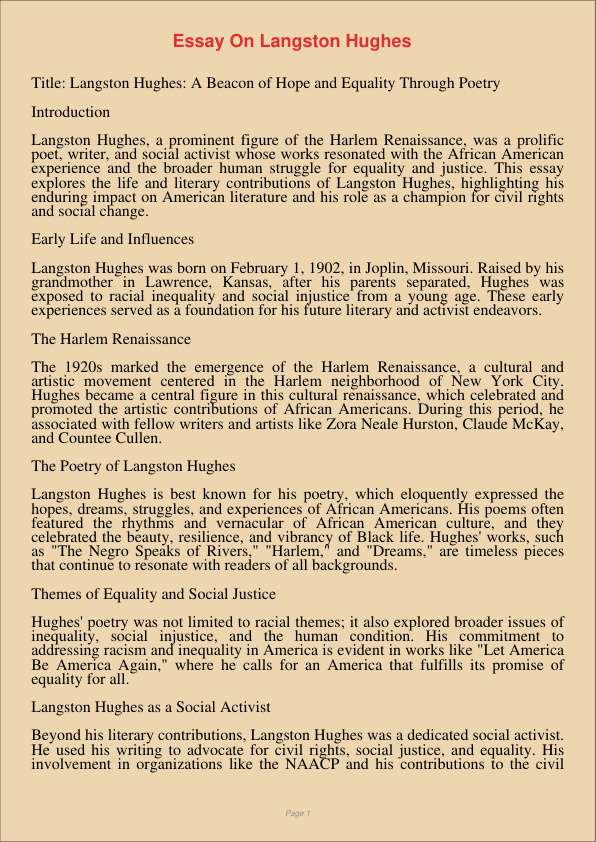Essay On Langston Hughes
Jan 9, 2024
langston hughes
essay
Macro & Microeconomics
Gender & Sexual Studies

Title: Langston Hughes: A Beacon of Hope and Equality Through Poetry
Introduction
Langston Hughes, a prominent figure of the Harlem Renaissance, was a prolific poet, writer, and social activist whose works resonated with the African American experience and the broader human struggle for equality and justice. This essay explores the life and literary contributions of Langston Hughes, highlighting his enduring impact on American literature and his role as a champion for civil rights and social change.
Early Life and Influences
Langston Hughes was born on February 1, 1902, in Joplin, Missouri. Raised by his grandmother in Lawrence, Kansas, after his parents separated, Hughes was exposed to racial inequality and social injustice from a young age. These early experiences served as a foundation for his future literary and activist endeavors.
The Harlem Renaissance
The 1920s marked the emergence of the Harlem Renaissance, a cultural and artistic movement centered in the Harlem neighborhood of New York City. Hughes became a central figure in this cultural renaissance, which celebrated and promoted the artistic contributions of African Americans. During this period, he associated with fellow writers and artists like Zora Neale Hurston, Claude McKay, and Countee Cullen.
The Poetry of Langston Hughes
Langston Hughes is best known for his poetry, which eloquently expressed the hopes, dreams, struggles, and experiences of African Americans. His poems often featured the rhythms and vernacular of African American culture, and they celebrated the beauty, resilience, and vibrancy of Black life. Hughes’ works, such as “The Negro Speaks of Rivers,” “Harlem,” and “Dreams,” are timeless pieces that continue to resonate with readers of all backgrounds.
Themes of Equality and Social Justice
Hughes’ poetry was not limited to racial themes; it also explored broader issues of inequality, social injustice, and the human condition. His commitment to addressing racism and inequality in America is evident in works like “Let America Be America Again,” where he calls for an America that fulfills its promise of equality for all.
Langston Hughes as a Social Activist
Beyond his literary contributions, Langston Hughes was a dedicated social activist. He used his writing to advocate for civil rights, social justice, and equality. His involvement in organizations like the NAACP and his contributions to the civil rights movement played a crucial role in raising awareness about racial injustice.
Legacy and Impact
Langston Hughes’ legacy endures through his writings and his unwavering commitment to social change. His poetry continues to inspire readers and writers alike to confront issues of race, identity, and inequality. Hughes’ message of hope, resilience, and the possibility of a more just society remains relevant and influential.
Conclusion
Langston Hughes, a poet, writer, and activist, left an indelible mark on American literature and the civil rights movement. His poems served as a powerful voice for African Americans and advocated for social justice and equality for all. Hughes’ work continues to resonate, reminding us of the ongoing struggle for a more just and inclusive society and the enduring power of the written word to inspire change. His life and poetry are a testament to the capacity of literature to address and challenge the complexities of the human experience.